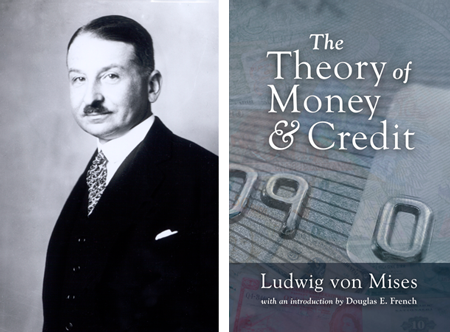It has been a full century since Mises dropped the economic calculation bomb, but the argument apparently still haunts socialists. It should, since Mises managed to show that a socialist economy is not an economy at all but calculational chaos. Yet it is curious that it does, since most have (incorrectly) concluded that Mises’s argument, after decades of debate, was debunked. Why does a presumably debunked argument still, drive even non-Austrian critics to pen new responses and deliberate on apparent flaws? Part of the answer might be that the debate ended without a proper conclusion. Mises’s critics, specifically the “market socialists” of the 1930s, misconstrued his argument as being about the existence, rather than meaning, of prices. Their answer, as simple
Topics:
Per Bylund considers the following as important: 6b) Mises.org, Andy Denis, Featured, Kevin Carson, newsletter
This could be interesting, too:
Nachrichten Ticker - www.finanzen.ch writes Die Performance der Kryptowährungen in KW 9: Das hat sich bei Bitcoin, Ether & Co. getan
Nachrichten Ticker - www.finanzen.ch writes Wer verbirgt sich hinter der Ethereum-Technologie?
Martin Hartmann writes Eine Analyse nach den Lehren von Milton Friedman
Marc Chandler writes March 2025 Monthly

It has been a full century since Mises dropped the economic calculation bomb, but the argument apparently still haunts socialists. It should, since Mises managed to show that a socialist economy is not an economy at all but calculational chaos. Yet it is curious that it does, since most have (incorrectly) concluded that Mises’s argument, after decades of debate, was debunked.
Why does a presumably debunked argument still, drive even non-Austrian critics to pen new responses and deliberate on apparent flaws?
Part of the answer might be that the debate ended without a proper conclusion. Mises’s critics, specifically the “market socialists” of the 1930s, misconstrued his argument as being about the existence, rather than meaning, of prices. Their answer, as simple as it was unsatisfying, was to create artificial prices centrally adjusted for emerging shortages and surpluses. The rejoinder then addressed the flaws in the attempted response rather than returning to the fundamental issue.
Part of the answer might also be that Mises’s argument provocatively shows not only that there is order to markets, but also that order cannot exist without them. And he further shows that it is not a matter of finding the answer to a puzzle, but that the answer is the puzzle. To put it very simply, markets work.
This of course makes those who are skeptical or even opposed to markets see red. And Mises goes further and states that not only do markets work, but that they can only work if there is private property. The entrepreneurial bidding that determines market prices, on which individual entrepreneurs appraise their undertakings, is a division of intellectual labor that works because those taking part can earn money profits but also suffer losses. Without the risk of suffering personal losses, bids are not truly economic and therefore cannot determine real market prices. As a result, no real calculation is possible. The system fails.
The issue of private property as a necessary precondition for calculation, as Mises argues, has become a matter of renewed debate. For example, Andy Denis, a professor at City University London, argues that Mises’s argument only requires decentralized decision-making, not necessarily ownership. Proper economic calculation should then, Denis argues, be possible under a system of complete state ownership with several controls. (I respond to this argument in an article coauthored with G.P. Manish and elaborate on it in a follow-up paper.)
Similarly, Kevin Carson of the Center for a Stateless Society, who is decidedly promarket but antiproperty, argues at that “if Mises’ critique proves anything it proves too much.” Carson’s argument differs from Denis’s in that it focuses on the institutional setting for markets as precursors. Writes Carson:
The allocation of the most fundamental factor inputs is not set by a market mechanism in virtually any economic system. Markets presuppose, as a meta-principle logically prior to their functioning, the choice of a particular set of property rules out of many possible sets. The formation of market clearing prices for factor inputs, under the laws of supply and demand, takes place only within the framework of this prior set of property allocation and governance rules.
The present market is not based on justly acquired property but rather rests, historically speaking, on the almost perfectly unjust property allocation that was inherited from feudalism. Consequently, “capitalism operates in an environment of massive calculational chaos, with incentives distorted by artificial scarcity or artificial abundance at virtually every turn.”
I will not argue against this conclusion, because it is largely accurate. Prior injustices do not automatically disappear but rather skew the outcome of the system for as long as resources, as a result, become misallocated (i.e., malinvested). Austrians use the same type of argument against imposed regulations on the market, which similarly distort market signals and resource allocation.
Carson continues:
Given a different foundational property rights regime—for example, commons governance of information, land, and resources—the resulting market-clearing prices would likely be far different. Likewise, the parties to which returns on inputs accrued—and hence incentives—would also be far different. In every system, the property allocation and governance rules themselves result from social or political choices that are prior to the market, and market pricing of inputs depends on those rules.
He is not wrong. The specifics of any property regime will certainly affect the prices determined by the entrepreneurial bidding process. However, this is not a flaw but a feature. Economic calculation is not about creating a certain allocation of resources, and even less some particular distribution of wealth.
Carson goes wrong in his analysis in the same way as leagues of socialist critics of Mises’s calculation argument before him. He assumes that Mises’s argument is about is the actual prices that are determined and that the economic calculation process therefore is a way to get those prices right. But this misses the fundamental point and, like the market socialists, thereby replaces Mises’s fundamental theoretical insight with the seemingly simple mechanism itself. The result is a rather tiresome bickering over whether the prices are right or wrong.
Economic calculation is not about the price-determining mechanism itself. Yes, the mechanism is important. But it is important because it determines prices that in turn generate system-level economizing of scarce productive resources in a never-ceasing market process of value creation. The point is not the prices themselves, but the price-determining process that allocates factors available in the present toward satisfying consumers’ wants in the future.
Although resource ownership in the present is indeed an outcome of previous actions and allocations, the prices that are determined are not historic but future prices. They are based on entrepreneurs’ best guesses of what consumers will want to consume at different times in the future. Consequently, the injustice of any distribution of property is quickly undone in a market through the economic calculation process.
It is true that owners of unjust property will be compensated through the prices determined in the economic calculation process. But this is of much lesser implication than socialists typically appear to think. First, whoever owns property but does not invest it in entrepreneurial attempts to satisfy consumers will not earn profits and so their relative wealth will dissipate with economic growth.
Second, those property owners who sell resources to entrepreneurs will be paid their market price. But they will only be paid once. Although this means that they will receive money to purchase goods and services, if this money is not itself invested toward the satisfaction of consumers’ future wants it is but another flavor of the previous case.
Third, those who lend it to entrepreneurs who pursue profits will earn the market rate (or a share of the profits of the new venture). But while this certainly makes them part of what Carson calls a “rentier class,” based on the property amassed unjustly, this cash inflow still depends on choosing to rent out to the entrepreneur who will earn profits. Even if the entrepreneur shoulders the risk of the venture, if he or she is wiped out by pursuing what turns out to be a bad idea the invested capital is typically either lost or damaged.
Fourth, the property owner can him- or herself act as entrepreneur and use his or her resources to produce goods that service consumers. Those resources will then either generate profits because the undertaking serves consumers better than other entrepreneurial endeavors, or losses.
The fact is that there is nothing permanent about capital in a market. As Austrians recognize, and have recognized since Menger, capital has value only for its expected contribution to consumers through market production. Idle capital is either a speculation that there will be better (more valuable) future uses or a loss.
It is true that some very durable property can be used for income over an extensive time period, but it is never enough to simply sit on that property and rake in money. Even land or rental properties require continuous investment to remain useful, and even more investment to remain attractive. Such investments, even for seemingly simple upkeep and maintenance, are entrepreneurial: unless they contribute to consumer satisfaction, they are wasteful. Nobody can stay rich by making wasteful investments.
As consumers decide which use of scarce resources is rewarded with profit, there is only one way of becoming and staying rich through the market process: by serving consumers. It is this promise that undergirds the bids placed in the open market and thus that determines the prices of resources. In the market, and through the economic calculation process, what has already happened is always, economically speaking, sunk. To maintain comparative riches one must satisfy consumers, and that can only happen by speculating under the threat of losing it all.
Whatever injustice caused the present or prior resource allocations has close to no impact on the actual outcomes of resource uses, since all efforts are mercilessly evaluated (and thus rewarded or punished) by consumers in their future purchase and use decisions. Who owns a resource is of little importance, because all ownership is subject to either partaking in the market process, thereby earning profits by serving consumers or suffering losses by failing to do so, or lying idle and consequently missing out on potential returns.
This is not to say that injustices are somehow unimportant. They certainly are, and libertarians tend to be too forgiving about prior injustices and privilege. However, as Austrians we recognize, with Mises, that unjust property distributions have far less impact on market outcomes, and much less staying power, than socialists assume. The unjust allocation of property cannot persist unless the injustice is repeated. Only protected resource owners can earn profits without serving consumers.
Mises’s economic calculation argument shows why: because calculation is a fundamentally entrepreneurial process that takes place in the present, the fate of each undertaking to be determined in the future by sovereign consumers.
Tags: Andy Denis,Featured,Kevin Carson,newsletter







